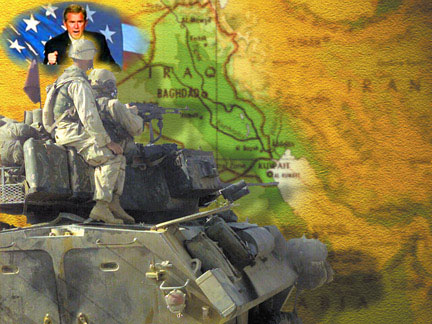JIM.LOBE
- Is Haditha massacre a sign that U.S. troops hate Iraqis? (FCN, 06-29-2006)
- How the U.S. Government destabilized foreign governments (FCN, 06-21-2006)

WASHINGTON, (IPS/GIN) – Three years after the U.S.-led invasion of Iraq, the image of the United States in Europe and the Islamic world has resumed its post-war slide, according to the latest in a series of surveys of public opinion in 14 countries released by the Pew Global Attitudes Project (PGAP).
Support for Washington’s “global war on terror” has also declined, according to the survey of nearly 17,000 people, and confidence in the leadership of President Bush, as well as the United States, is at its lowest ebb.
In 12 of the 14 foreign countries surveyed, strong pluralities of 44 percent (Russia and China) to majorities of up to 76 percent (France) said the Iraq war had made the world “more dangerous.” The only exceptions were India and Nigeria, where pluralities of 41 percent of respondents said the world had been made “safer.”
In addition to those two countries, the survey, which was conducted in April and May, included four Western countries–Britain, France, Germany and Spain; five predominantly Islamic countries–Egypt, Indonesia, Pakistan, Jordan and Turkey; along with Russia, Japan and China, and the U.S., and covered a range of issues including attitudes toward global warming, avian flu, Iran and the Israeli-Palestinian conflict.
Shortly after the invasion, the survey showed a stunning drop in favorable attitudes toward Pres. Bush and the U.S., particularly among Washington’s European allies and in the Islamic world.
In France, for example, the percentage of respondents with a favorable opinion of the U.S. fell from 63 percent in 2002 to 43 percent in 2003; in Indonesia, it fell from 61 percent to 15 percent; in Jordan, from 25 percent to just 1 percent.
The latest poll, however, shows a new deterioration in foreign attitudes toward the U.S. despite explicit efforts by the administration, especially Secretary of State Condoleezza Rice, to emphasize multilateral diplomacy over unilateral action.
Declines were particularly pronounced in Spain where the percentage of respondents with a favorable view of the U.S. fell from 41 percent last year to 23 percent; in Russia, from 52 percent to 43 percent; in Indonesia, from 38 percent to 30 percent; in Jordan, from 21 percent to 15 percent; in Turkey, from 23 percent to 12 percent; and in India, from 71 percent to 56 percent.
The U.S. image in Indonesia had also improved markedly as a result of its relief efforts following the December 2004 tsunami, only to resume its decline, however, over the year that followed.
That the resumption of Washington’s decline was due primarily to opposition to the Iraq war and the more-general “war on terror” was made clear not only by the large pluralities and majorities (in 10 of the 14 countries) who said the world had been rendered “more dangerous” by the U.S. invasion, but also by the belief in all but two countries–Germany and Japan–that the “American presence in Iraq” constituted a greater danger to world peace than the presumed nuclear ambitions of Iran or North Korea.
Even in Washington’s closest ally, Britain, respondents rated the U.S. presence in Iraq as a greater danger than Iran by a 41-34 percent margin, whereas in predominantly Islamic countries, it was rated three times (Jordan) to seven times (Pakistan) more dangerous.
The Pew survey, on the other hand, found that narrow pluralities in Egypt and Jordan and a majority in Pakistan favored Tehran’s acquisition of nuclear weapons.
On global issues, the survey found what it called an “extraordinarily high level of attentiveness to bird flu disease,” with more than 90 percent of respondents in all countries except Pakistan (82 percent) saying they had heard about the disease.
As to the issue of global warming, it found comparable awareness of the problem in the major industrialized countries–80 percent of respondents in Russia said they knew about the issue; compared to 78 percent in China, 75 percent in Turkey and 57 percent in India. Elsewhere, awareness was less than 50 percent, with only 12 percent in Pakistan.
In general, views of Pres. Bush and the U.S. were most favorable in Asia and Nigeria, where opinion was sharply divided on many of the subjects polled between Muslims and Christians. Pres. Bush was most popular in India, where 56 percent of respondents expressed confidence in his leadership, and Nigeria, 52 percent.
In China and Japan, roughly one-third rated him favorably, followed by Britain, at 30 percent. His lowest ratings were found in Turkey (3 percent), Spain and Jordan (7 percent), Egypt (8 percent), and Pakistan (10 percent).












